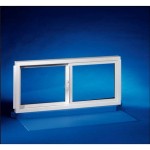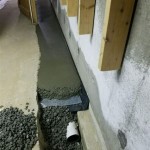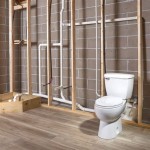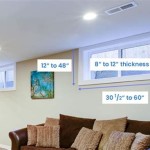Best Flooring Options For Concrete Basements
Concrete basements, while structurally sound, often present unique challenges when it comes to flooring. Their inherent coldness, potential for moisture, and hardness require careful consideration when selecting the most appropriate flooring material. The optimal choice balances aesthetics, functionality, and cost-effectiveness, ensuring a comfortable and durable basement environment. This article explores various flooring options suitable for concrete basements, highlighting their advantages, disadvantages, and key considerations for successful installation.
Understanding Basement Flooring Challenges
Before delving into specific flooring materials, it's crucial to understand the common issues associated with concrete basements. These challenges directly impact the performance and longevity of any flooring installation.
Moisture: Concrete is porous and can absorb moisture from the ground. This moisture can lead to mold growth, mildew, and damage to certain flooring materials like solid hardwood. Proper moisture testing and mitigation strategies are essential before installing any flooring.
Temperature Fluctuations: Basements are often subject to significant temperature variations, especially during seasonal changes. These fluctuations can cause expansion and contraction of flooring materials, potentially leading to cracking, warping, or buckling if the flooring is not properly acclimatized and installed.
Uneven Surfaces: Concrete basement floors are rarely perfectly level. Imperfections, cracks, and settling can create uneven surfaces that require leveling before installing most flooring options. Self-leveling compounds or grinding may be necessary to achieve a smooth and even subfloor.
Hardness and Sound Transmission: Concrete is a hard and unforgiving surface. This can make basements feel cold and uncomfortable underfoot. Additionally, concrete transmits sound easily, potentially creating noise issues for rooms above.
Popular Flooring Options for Concrete Basements
Considering these challenges, certain flooring materials are better suited for concrete basements than others. Here's a detailed look at some of the most popular and effective options:
Engineered Wood Flooring: Engineered wood is a multi-layered product consisting of a thin veneer of hardwood bonded to a core of plywood or other composite material. This construction makes it more dimensionally stable than solid hardwood, meaning it's less susceptible to warping or buckling due to moisture and temperature changes. However, it is not entirely waterproof, and excessive moisture exposure can still cause damage. A moisture barrier is crucial when installing engineered wood over concrete.
Advantages: Offers the aesthetic appeal of real hardwood, more moisture-resistant than solid hardwood, relatively easy to install, available in a wide range of styles and finishes.
Disadvantages: More expensive than some other options, not completely waterproof, can be damaged by excessive moisture, requires a moisture barrier.
Luxury Vinyl Flooring (LVF): Luxury vinyl flooring is a synthetic flooring material that mimics the look of hardwood, tile, or stone. It is available in planks (LVP) or tiles (LVT) and is known for its durability, water resistance, and ease of maintenance. LVF is an excellent choice for basements due to its inherent resistance to moisture and its ability to withstand temperature fluctuations.
Advantages: Highly water-resistant, durable, easy to clean and maintain, available in a wide range of styles and colors, relatively affordable, easy to install (especially click-lock versions).
Disadvantages: Does not have the same warmth or feel as real wood or stone, can be susceptible to scratching, lower-quality versions may contain VOCs (volatile organic compounds).
Tile Flooring: Tile, including ceramic and porcelain, is a durable and water-resistant option for concrete basements. Porcelain tile is particularly well-suited due to its low water absorption rate. Tile is resistant to mold and mildew and can withstand heavy foot traffic. Its inherent coolness can be mitigated with the installation of radiant floor heating.
Advantages: Highly durable, water-resistant, resistant to mold and mildew, easy to clean, available in a wide range of styles, colors, and sizes, suitable for high-traffic areas.
Disadvantages: Can be cold and hard underfoot, requires professional installation, can be expensive, prone to cracking if the subfloor is uneven or experiences significant movement.
Epoxy Flooring: Epoxy flooring is a durable and seamless coating applied directly to the concrete floor. It is resistant to moisture, stains, and chemicals, making it a practical choice for basements used as workshops or for storage. Epoxy flooring is also available in a variety of colors and finishes, allowing for customization.
Advantages: Highly durable, water-resistant, stain-resistant, chemical-resistant, seamless, easy to clean, customizable, can be used to create a modern and industrial look.
Disadvantages: Requires professional installation, can be expensive, can be slippery when wet, can be difficult to repair if damaged, may require special preparation of the concrete surface.
Carpet Tiles: Carpet tiles are a modular flooring option that consists of individual squares of carpet. They are relatively easy to install and replace, making them a practical choice for basements. Carpet tiles can provide warmth and sound absorption, making the basement more comfortable. However, carpet is susceptible to moisture damage, so it's essential to address any moisture issues before installation.
Advantages: Relatively easy to install and replace, provides warmth and sound absorption, available in a variety of colors and patterns, can be easily cleaned and maintained, individual tiles can be replaced if damaged.
Disadvantages: Susceptible to moisture damage, can harbor allergens, requires regular cleaning, may not be as durable as other options, requires a very flat subfloor.
Rubber Flooring: Rubber flooring is a resilient and durable option that's often used in gyms and playrooms. It's impact-resistant, sound-absorbing, and relatively easy to clean. Rubber flooring is also water-resistant, making it a suitable choice for basements. It comes in tiles, rolls, and mats.
Advantages: Durable, impact-resistant, sound-absorbing, water-resistant, comfortable underfoot, easy to clean, available in a variety of colors and textures.
Disadvantages: Can be expensive, may have a rubbery odor initially, can be susceptible to staining, may not be aesthetically appealing for all uses.
Key Considerations for Choosing Basement Flooring
Several factors should be considered when selecting the best flooring option for a concrete basement. These considerations will help ensure a successful and long-lasting installation.
Moisture Testing and Mitigation: Before installing any flooring, it's crucial to test the concrete slab for moisture. A simple plastic sheet test can indicate the presence of moisture. If moisture levels are high, a vapor barrier or other moisture mitigation strategies should be implemented. This may involve applying a waterproof membrane to the concrete surface or installing a subfloor system with built-in ventilation.
Subfloor Preparation: The concrete subfloor needs to be properly prepared before installing any flooring. This typically involves cleaning the surface, filling cracks and imperfections, and leveling the floor as needed. Self-leveling compounds can be used to create a smooth and even surface.
Budget: The cost of flooring can vary significantly depending on the material and installation requirements. It's important to establish a budget and consider the long-term costs of maintenance and repair. Cheaper options may require more frequent replacement, while more expensive options may offer greater durability and longevity.
Intended Use: The intended use of the basement will influence the best flooring choice. A basement used as a living space may benefit from a warmer and more comfortable flooring option like engineered wood or carpet tiles. A basement used as a workshop or storage area may be better suited for a more durable and water-resistant option like epoxy or rubber flooring.
Installation: Some flooring options, such as luxury vinyl and carpet tiles, are relatively easy to install as a DIY project. Others, such as tile and epoxy flooring, require professional installation. Consider your DIY skills and the complexity of the installation process when making your decision. Professional installation will ensure a proper and long-lasting result, but it will also add to the overall cost.
Aesthetics: The aesthetic appeal of the flooring is also an important consideration. Choose a flooring material that complements the overall style and décor of the basement. Consider the color, texture, and pattern of the flooring and how it will coordinate with other elements in the space.
R-Value and Insulation: Concrete basements tend to be cold, so consider the R-value (resistance to heat flow) of the flooring material. Some flooring options, like carpet and cork, offer better insulation than others, like tile and concrete. Adding a subfloor with insulation can also help to improve the thermal comfort of the basement.
Sound Absorption: Concrete is a poor sound absorber, so consider the sound absorption properties of the flooring material. Options like carpet, rubber, and cork can help to reduce noise levels in the basement. Adding a subfloor with soundproofing properties can also improve the acoustics of the space.
By carefully considering these factors and evaluating the advantages and disadvantages of each flooring option, homeowners can choose the best flooring for their concrete basement, creating a comfortable, functional, and aesthetically pleasing space.

How To Carpet A Basement Floor Diy Family Handyman

6 Inspiring Ideas For Basement Flooring In Portland

What Is The Best Flooring For A Concrete Floor Basement Illinado Llc

What Is The Best Flooring To Put On A Concrete Basement Floor

Best Basement Flooring The Warmest Floor Covering Is Cork

How To Choose The Right Floor For Your Basement Gc Flooring Pros

Best Flooring For Basement Renovations

The Best Flooring Options For Your Basement America

The Best Flooring Options For Your Basement From Forest Llc

What Are The Best Flooring For Basement In Homes







